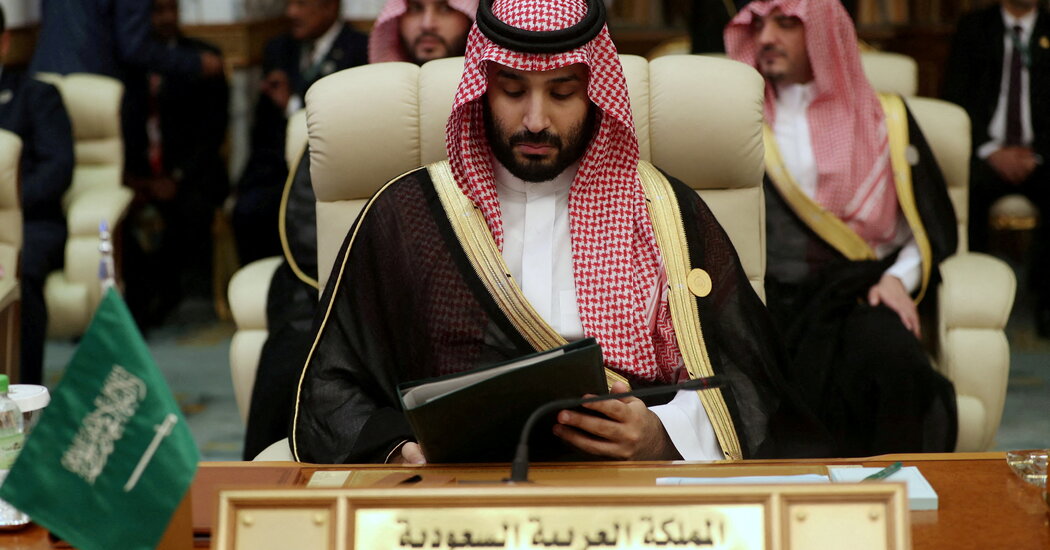
WASHINGTON — President Biden, who as a candidate vowed to make Saudi Arabia a “pariah” in response to the assassination of a prominent dissident, has decided to travel to Riyadh this month to rebuild relations with the oil-rich kingdom at a time when he is seeking to lower gas prices at home and isolate Russia abroad.
While the logistics and timing were still being worked out, Mr. Biden planned to add the visit to a previously scheduled trip to Europe and Israel, administration officials said, asking for anonymity because the trip had not been formally announced. During his stop in Riyadh, he will meet with Crown Prince Mohammed bin Salman, who was deemed responsible for the assassination, as well as the leaders of other Arab nations, including Egypt, Jordan, Iraq and the United Arab Emirates.
The visit represents the triumph of realpolitik over moral outrage, according to foreign policy experts. In the wake of Russia’s invasion of Ukraine, Mr. Biden finds it necessary to court other energy producers to replace oil from Moscow and stabilize world markets. The group of oil-producing nations called OPEC Plus, led by Saudi Arabia, announced on Thursday that they would increase production modestly in July and August. American officials expect them to do more in the fall, but it may not be enough to bring down prices at the pump before November’s congressional elections.
The Biden administration has already been stepping up cooperation with Saudi Arabia on a variety of issues in recent months, particularly in seeking an end to the eight-year-old Saudi-led war in neighboring Yemen. A two-month-old truce was extended on Thursday, and Mr. Biden praised Saudi leaders for their role. “Saudi Arabia demonstrated courageous leadership by taking initiatives early on to endorse and implement terms of the U.N.-led truce,” he said in a statement.
The diplomacy and the president’s trip represent an effort to repair the rupture in relations stemming from the brutal 2018 killing of Jamal Khashoggi, a well-known critic of the Saudi government and a columnist for The Washington Post. American intelligence concluded that Prince Mohammed, the de facto leader of the kingdom, ordered the hit team that killed and dismembered Mr. Khashoggi at a consulate in Istanbul.
While President Donald J. Trump retained close relations with the Saudis, Mr. Biden promised to take a different tack if elected to the White House. He said that he would make the Saudis “pay the price, and make them in fact the pariah that they are,” while saying that there was “very little social redeeming value in the present government in Saudi Arabia.”
After taking office, Mr. Biden released the intelligence report on Mr. Khashoggi’s murder as a statement of accountability and imposed sanctions on some of those involved in the killing. But he took no action against Prince Mohammed, drawing a limit to how far he was willing to break with Riyadh even before Russia’s invasion of Ukraine roiled energy markets and increased Saudi Arabia’s importance to Washington.
The administration argues that it ended the Trump team’s policy of blank checks for Riyadh but was not willing to end America’s eight-decade-old friendship with Saudi Arabia, which has been an important ally on a variety of issues.
“Saudi Arabia is a critical partner to us in dealing with extremism in the region, in dealing with the challenges posed by Iran, and also I hope in continuing the process of building relationships between Israel and its neighbors both near and further away through the continuation, the expansion of the Abraham Accords,” Secretary of State Antony J. Blinken said on Wednesday at an event marking the 100th anniversary of Foreign Affairs magazine.
Mr. Biden was already planning to end the isolation of Prince Mohammed as far back as last October when he expected to encounter the Saudi leader at a meeting of the Group of 20 leaders, but the prince did not attend.
Understanding the Khashoggi Murder Case
But the newly planned stop in Riyadh, previously reported by David Ignatius, a columnist for The Post, produced quick criticism from human rights groups, denouncing any diplomatic rehabilitation of Prince Mohammed.
“Right now, Biden is buffeted by intersecting crises, and certain human rights priorities are suffering as a result,” said Suzanne Nossel, the chief executive of PEN America, a group that advocates for writers around the world. “The harder it gets to put human rights above politics, the more consequential it is for the world to witness a leader willing to do so.”




